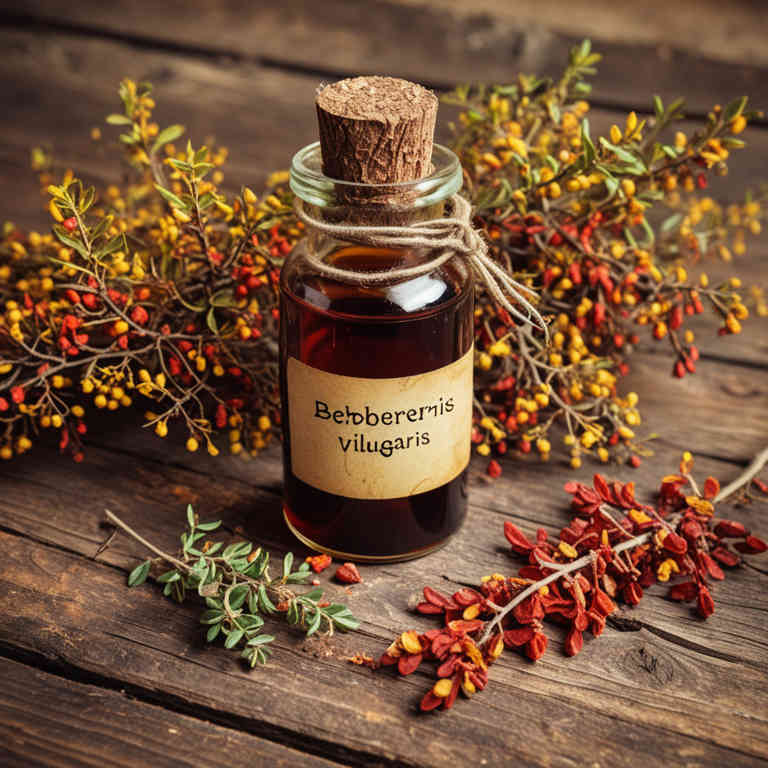Berberis vulgaris tincture for medicinal use

Berberis vulgaris tincture is a concentrated liquid extract made from the roots and stems of the barberry plant, which contains the alkaloid berberine.
This preparation has been used in herbal medicine for centuries to support digestive health and treat infections due to its antimicrobial and anti-inflammatory properties. It is commonly used to address conditions such as diarrhea, urinary tract infections, and skin irritations. In traditional herbalism, it is often taken in small doses to stimulate bile production and improve liver function.
However, it should be used with caution and under the guidance of a qualified herbalist due to its potency and potential side effects.
Uses
Berberis vulgaris tincture has been used to treat a variety of ailments across different cultures and time periods.
Historically, it was valued in traditional Chinese and Ayurvedic medicine for its antimicrobial and anti-inflammatory properties. In modern times, it is often used as a natural remedy for digestive issues, skin conditions, and infections due to its active compound, berberine. It has also gained attention in contemporary herbal medicine for its potential role in managing blood sugar levels and supporting cardiovascular health.
However, its use should be approached with caution due to potential toxicity if not properly prepared or administered.
Benefits
Berberis vulgaris tincture has health benefits such as supporting digestive health, boosting the immune system, and exhibiting antimicrobial properties.
It is traditionally used to treat gastrointestinal issues like diarrhea and inflammatory bowel conditions. The active compound, berberine, helps regulate blood sugar levels and may improve cardiovascular health. It also has potential anti-inflammatory and antioxidant effects that contribute to overall wellness.
This herbal preparation is often used in traditional medicine for its broad range of therapeutic applications.
Constituents
Berberis vulgaris tincture active constituents include alkaloids such as berberine, berbamine, and berbamine, which are known for their potent pharmacological properties.
These compounds exhibit antimicrobial, anti-inflammatory, and antioxidant effects, making the tincture useful for treating infections and supporting digestive health. Berberine, in particular, has been studied for its potential to regulate blood sugar and improve cardiovascular health. The tincture is commonly used in traditional medicine for its ability to support liver function and reduce inflammation.
However, it should be used with caution due to potential side effects and interactions with certain medications.
Preparation
To make Berberis vulgaris tincture, start by gathering fresh or dried Berberis vulgaris (barberry) roots, ensuring they are clean and free from contaminants.
Next, place the roots in a glass jar and cover them completely with high-proof alcohol, such as 80-100 proof vodka or grain alcohol. Seal the jar and let it sit in a dark, cool place for 4 to 6 weeks, shaking it gently every few days to ensure even extraction. After the steeping period, strain the liquid through a fine mesh strainer or cheesecloth to remove the plant material.
Finally, store the tincture in a dark glass bottle in a cool, dry place, away from direct sunlight, and use it as needed for its traditional medicinal purposes.
Side Effects
Berberis vulgaris tincture may lead to gastrointestinal discomfort, including nausea, vomiting, and diarrhea, due to its potent alkaloid content.
It can also cause skin irritation or allergic reactions in sensitive individuals. Prolonged use may result in liver damage, as some studies suggest hepatotoxic effects. High doses can lead to neurological symptoms such as dizziness or confusion.
It is important to consult a healthcare professional before using this preparation, especially for individuals with pre-existing medical conditions or those taking other medications.